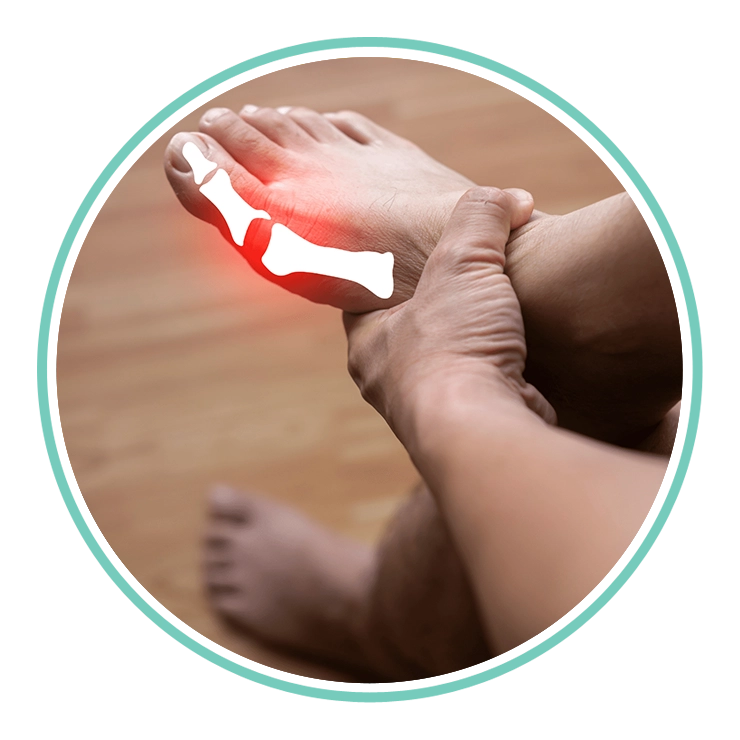Introduction
Gout, a form of arthritis characterized by intense joint pain and inflammation, can be a challenging condition to manage. However, with advances in medical science and a holistic approach to care, there are effective treatments available to provide relief from the symptoms of gout. In this blog post, we will explore various gout treatments, ranging from lifestyle modifications to medications, offering a comprehensive guide to navigating the path to relief.
Lifestyle Modifications:
1. Dietary Changes:
- Limit Purine-Rich Foods: Gout is triggered by the accumulation of uric acid, which is produced when the body breaks down purines. Limiting the intake of purine-rich foods, such as red meat, organ meats, and certain seafood, can help manage uric acid levels.
- Hydration: Staying well-hydrated is crucial for flushing out excess uric acid. Adequate fluid intake, particularly water, supports kidney function and helps prevent the crystallization of uric acid in the joints.
2. Weight Management:
- Maintaining a Healthy Weight: Obesity is a significant risk factor for gout. Achieving and maintaining a healthy weight through a balanced diet and regular exercise can reduce the frequency and severity of gout attacks.
3. Limit Alcohol Intake:
- Moderation is Key: Alcohol, especially beer and spirits, can increase uric acid levels. Limiting alcohol intake or avoiding it altogether can be beneficial in managing gout.
4. Regular Exercise:
- Low-Impact Activities: Engaging in regular, low-impact exercises, such as walking, swimming, or cycling, not only supports overall health but also helps maintain joint flexibility and reduce the risk of gout flare-ups.
Medications:
1. Nonsteroidal Anti-Inflammatory Drugs (NSAIDs):
- Pain Relief: NSAIDs, such as ibuprofen or naproxen, provide relief from pain and inflammation during acute gout attacks. They are often used as first-line treatments.
2. Colchicine:
- Anti-Inflammatory Medication: Colchicine is an anti-inflammatory medication that can be used to relieve gout symptoms and prevent recurrent attacks. It is particularly effective when started early in an attack.
3. Corticosteroids:
- Swift Relief: Corticosteroids, either administered orally or injected into the affected joint, can provide rapid relief from severe gout symptoms during flare-ups.
4. Xanthine Oxidase Inhibitors:
- Reducing Uric Acid Production: Medications like allopurinol and febuxostat work by inhibiting the production of uric acid, thereby lowering overall levels in the body.
5. Uricosuric Agents:
- Increasing Uric Acid Excretion: Drugs like probenecid enhance the excretion of uric acid, preventing its buildup in the joints.
Preventive Measures:
1. Long-Term Medication:
- Uric Acid-Lowering Medications: For individuals with recurrent gout attacks or high uric acid levels, long-term use of medications to lower uric acid levels may be prescribed to prevent future flare-ups.
2. Lifestyle Education:
- Patient Empowerment: Educating individuals about the importance of lifestyle changes, medication adherence, and recognizing triggers empowers them to actively participate in managing their gout.
3. Regular Monitoring:
- Uric Acid Levels: Regular blood tests to monitor uric acid levels help assess the effectiveness of treatment and make adjustments as needed.
Holistic Approaches:
1. Stress Management:
- Mind-Body Connection: Stress can trigger gout attacks. Incorporating stress-reducing practices such as meditation, yoga, or deep breathing exercises can be beneficial.
2. Joint Protection:
- Proper Joint Care: Avoiding excessive stress on joints, using supportive footwear, and protecting joints during physical activities contribute to joint health.
Conclusion:
Gout treatments encompass a combination of lifestyle modifications, medications, and preventive measures. The key to effective management lies in a personalized approach that addresses the unique needs and circumstances of each individual. Seeking medical attention promptly, adopting healthy lifestyle habits, and working closely with healthcare professionals can help individuals successfully navigate the path to relief and long-term joint health.
If you suspect you have gout or are experiencing symptoms, it's essential to consult with a healthcare professional for an accurate diagnosis and appropriate treatment plan tailored to your specific condition.
